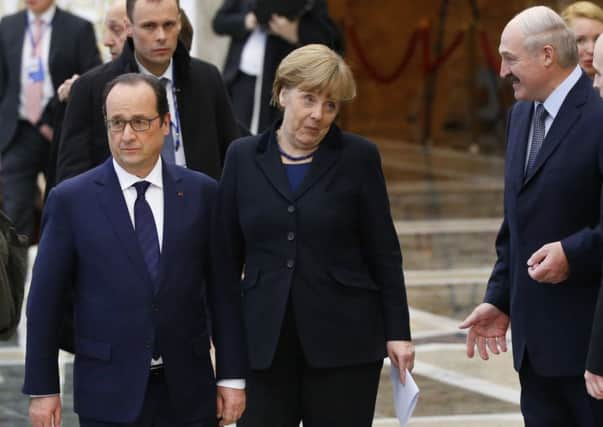Ukraine rebels claim victory after ceasefire deal


The agreement was reached yesterday morning after lengthy overnight negotiations between the leaders of Germany, France, Russia and Ukraine in Minsk, the capital of Belarus.
Under the terms of the deal, guns should fall silent on Sunday morning, and that should be followed by prisoner exchanges, the withdrawal of heavy weapons from the front and immunity from criminal prosecution for the fighters involved.
Advertisement
Hide AdAdvertisement
Hide AdThe agreement also calls for the removal of all “foreign armed formations” and mercenaries, and the disarmament of illegal groups.
Alexander Zakharchenko, a Moscow-backed separatist leader, welcomed the agreement.
FOLLOW US
SCOTSMAN TABLET AND MOBILE APPS
“This is a great victory for [self-proclaimed rebel regions] the Donetsk People’s Republic and the Lugansk People’s Republic,” he told the separatists’ news agency. He also said it gave “hope for a peaceful resolution” of a conflict that started last April and has claimed more than 5,400 lives.
Although rebel forces will have to cede some land gained in a recent offensive, the Minsk agreement leaves them in firm control of large areas of eastern Ukraine, and while it calls for foreign troops to leave the country, it sets no deadline for this and just who would verify any withdrawal remains unclear.
This plays into the rebels’ hands, because it would make the removal of Russian troops allegedly active on Ukrainian soil a difficult process and almost impossible to monitor given that the agreement also postpones Ukraine regaining control of its eastern border until the end of the year at the earliest.
Despite this, the German and French leaders gave the agreement a cautious welcome. “We now have a glimmer of hope,” said German chancellor Angela Merkel, who helped lead the negotiations in Minsk, adding: “Concrete steps must of course be taken and there will still be big hurdles ahead.”
French president Francois Hollande called the deal a “comprehensive political solution”. At an EU summit in Brussels after returning from Minsk, he said: “The next few hours will be decisive as it could go either way. We will have to remain vigilant, to maintain the pressure and to press ahead.”
Russian president Vladimir Putin, whom many have accused of orchestrating the war to stop Ukraine moving closer to the West by destabilising it, also struck an upbeat, if somewhat muted, note.
Advertisement
Hide AdAdvertisement
Hide Ad“It wasn’t the best night of my life, but the morning, in my opinion, is a good one because, despite all the complexities of the negotiating process, we still managed to agree on the main points,” he said.
Petro Poroshenko, the president of Ukraine, refrained from praising the agreement, saying its main achievement had been an “unconditional ceasefire”.
Critics of the deal have already pointed out that it bears a similarity to a truce agreement signed in September that failed to prevent a return to war and offered no long-term political solution.